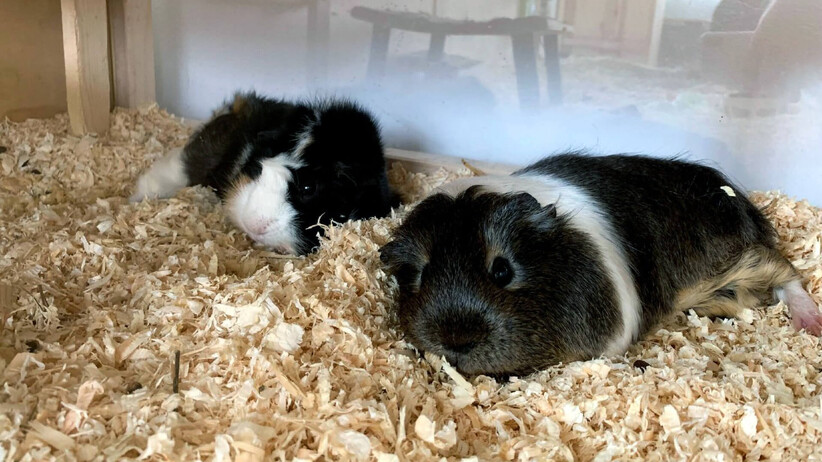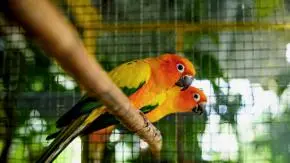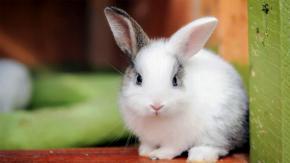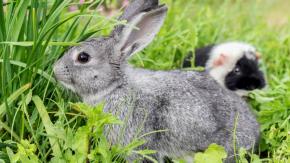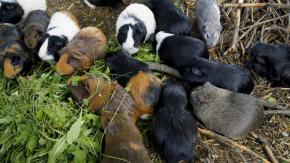Choosing the right-sized house for a guinea pig can be confusing.
Although you may think that their small bodies don’t need much space, the truth is far from that. And this causes many first-time guinea pig parents to buy a smaller cage or hutch, making the animals feel extremely uncomfortable.
We are here to help you determine the space your new pet friend needs. So, dive in!
How Much Space Do Guinea Pigs Need?
There’s no one fixed measurement for an indoor guinea pig housing, as the minimum guinea pig cage size will largely depend on the number of guinea pigs you have. For instance, if you want to keep one guinea pig in a cage or hutch, the general rule of thumb says that the cage should measure at least 30 inches x 36 inches.
Likewise, if you have two guinea pigs, the minimum requirement will be 7.5 square feet, but we’d suggest keeping a minimum space of 10.5 square feet. In the case of three guinea pigs, the minimum cage size to opt for is 10.5 to 13 square feet. And for four guinea pigs, allocate a cage or hutch with dimensions of 30 inches x 62 inches or 30 inches x 76 inches.
But if you don’t want to get into the hassle of measuring cages, we have a quick fix: simply buy a cage or hutch that looks the biggest (provided you have the space to accommodate it).
Why Do They Need Bigger Cages?
Now, you may be wondering why these small animals need bigger spaces, so let us break down the “science” behind it.
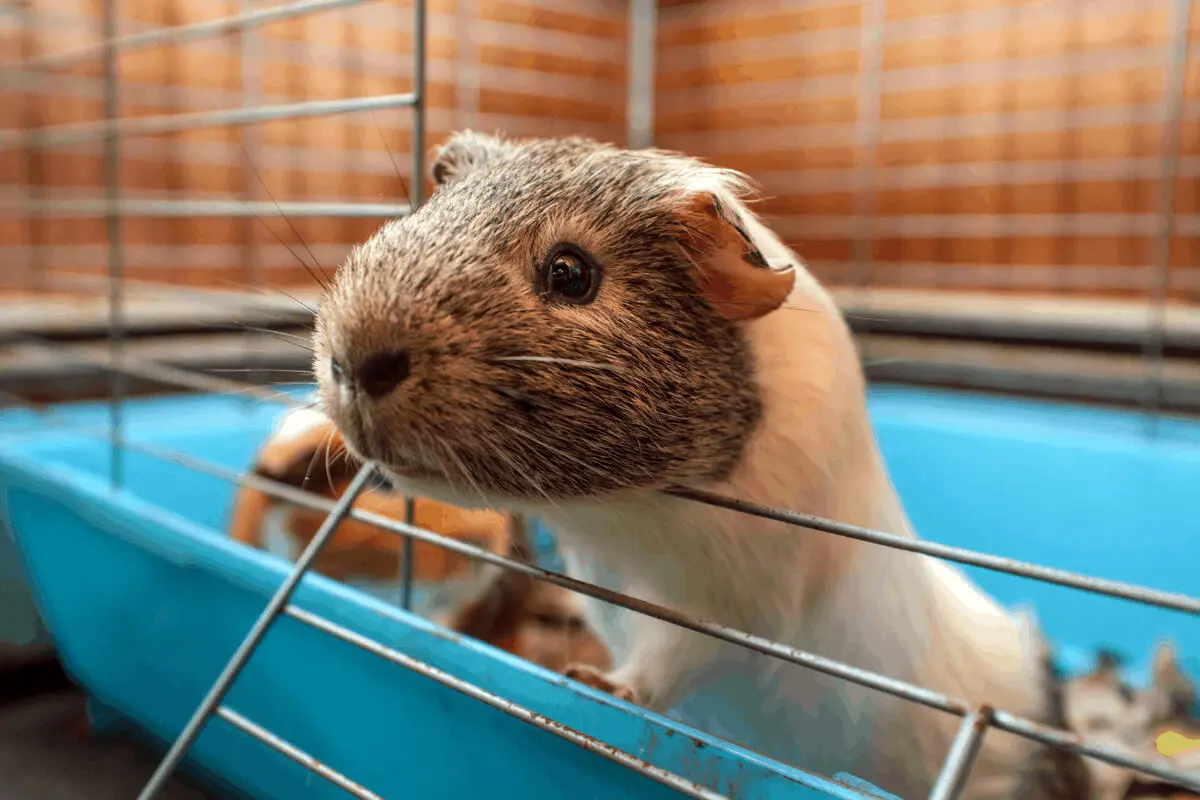
1. More Room Will Keep Them Active
Firstly, unlike other smaller animals like hamsters or gerbils that utilise the vertical space to dig and burrow, guinea pigs depend on the available floor space.
This means that you need to allocate ample space for them to move around and exercise. They are also very active, especially during the mornings and evenings, so even if you can’t interact with them at these times, a large cage will keep them busy for good.
Besides, having a larger cage will provide enough space to add accessories like ramps, slides, tunnels, etc. And these will, in turn, encourage them to exercise, preventing health issues like diabetes, heart problems and other respiratory problems that can otherwise become fatal.
2. A Bigger Cage Will Allow Housing More Animals
Guinea pigs are very social animals so you can keep them with other similar animals like rabbits. They are happy to share their living area with neighbours. And they tend to get sad and depressed if isolated for too long.
However, keep in mind that they become very aggressive, especially over food. Hence, bigger guinea pig cages will reduce the chances of unnecessary fights or conflicts.
3. Easy Maintenance For Owners
A bigger cage will make it easier for you to clean it regularly, as your little furry friends tend to do their business and eat in the same place. So, be prepared to clean a lot!
Another advantage of bigger floor space is that you can add a hay-equipped tray where they can go about their business. This will also keep their bedding free from odour and harmful bacteria.
What’s The Best Position For Your Guinea Pig Cage?
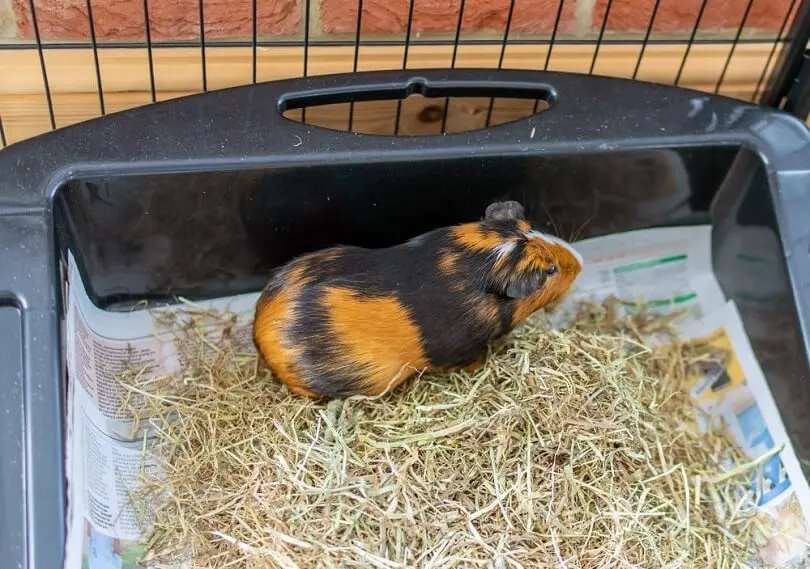
Now that you have an idea about the minimum cage sizes depending on the number of cavies they will house, let us walk you through the best places to keep one.
Remember that no matter how big or sturdy a cage is, your guinea pigs won’t thrive until the environment is suitable for their survival. So, one of the first things to ensure is that the ambient temperature ranges between 18 and 24 degrees Celsius, as these rodents are sensitive to heat and highly prone to heat strokes.
You should also ensure that they aren’t housed too close to appliances that emit heat, the fireplace, stoves, heating vents, or under direct sunlight. Similarly, you should keep the cage away from walls that get heated quickly.
Furthermore, excessive moisture or dampness can be detrimental to their health, as it may turn their bedding and hay tray into breeding grounds for harmful disease-causing bacteria. We’d strongly recommend placing them in a dry, cool (but not too cold) elevated area.
At the same time, guinea pigs like company, so you may want to place them in a room frequently visited by you or other family members and guests. A word of caution: guinea pigs have very sensitive eardrums, so make sure they aren’t exposed to loud noises.
Another consideration is to keep them away from other pets (especially the bigger ones, like cats or dogs) to prevent the guinea pigs from harming. And make sure to keep the cage or hatch safely from stray rats and mice.
How To Setup A Guinea Pig Cage?
Consider getting a ramp for the cage to turn into a two-storied home for the guinea pigs. You can also opt for a chicken coop to make even more space for them. And if you plan to keep the coop outdoors, look for one with an attached ramp that will make it easy for the guinea pigs to explore the outdoors.
We’d suggest choosing a hutch for outdoors and a wire cage for indoors, as the latter facilitates optimum ventilation but isn’t durable enough to resist the outdoor elements.
Aside from that, equip the cage or hutch with fleece liners or a canvas bottom. Fleece liners, in particular, make for a comfortable and safe surface to walk on, especially on wire floors. On the other hand, canvas bottoms are both leak-proof and comfortable. However, you will need to clean them regularly.
Beyond that, keep a sufficient amount of hay inside the cage or hutch to help them sleep well. Otherwise, the guinea pigs may feel uncomfortable and develop body aches quickly.
As we have already suggested, choose accessories that will make for an exciting play area for the guinea pigs, which will keep them active. You can also buy a salt lick or wooden chew that helps the cavies develop stronger gums and teeth.
Keep adequately large food bowls and water bottles to ensure proper food and water supply for all the animals. And clean them regularly, as any form of contamination can cause serious health issues.
Lastly, keep sufficient hideout spaces inside the cage or hutch. Guinea pigs are easily scared by the surrounding noises, movements, or lights. But providing enough shelter for them can help reduce their stress and positively impact their physical and mental well-being.
Things To Avoid

There are a few things that you should avoid while “designing” the interior of the guinea pig cage or hutch, which include:
- Accessories that can become choking hazards
- Wood with splinters or wire balls
- Bedding made of paper, sawdust or straw
- Cedar or pine shavings
- Sawdust and corncob bedding
Most of the materials mentioned above are toxic or can injure your guinea pigs fatally. For example, the sharp straw strands can poke them in the eye or ears, while inhaling sawdust can make them vulnerable to respiratory diseases.
The Right Amount Of Space For Your Guinea Pig!
On that note, it’s time for us to wrap up this guide.
Since female and male guinea pigs aren’t very different in their behaviour or looks, you can choose to pet either. Consider researching the different breeds to find the right one for your climate and home. But no matter which gender and breed you opt for or how many guinea pigs your house, it’s essential to provide them with a safe and clean environment.
And don’t forget to spend time with them to show your love.
Our team is always available to help you choose any of the above-mentioned items for your guinea pig, so please do not hesitate to contact us. At Planet Pet, we offer a large selection of small animal equipment, food, and accessories. Check out our online store today!
We will be back soon- till then, take care.

